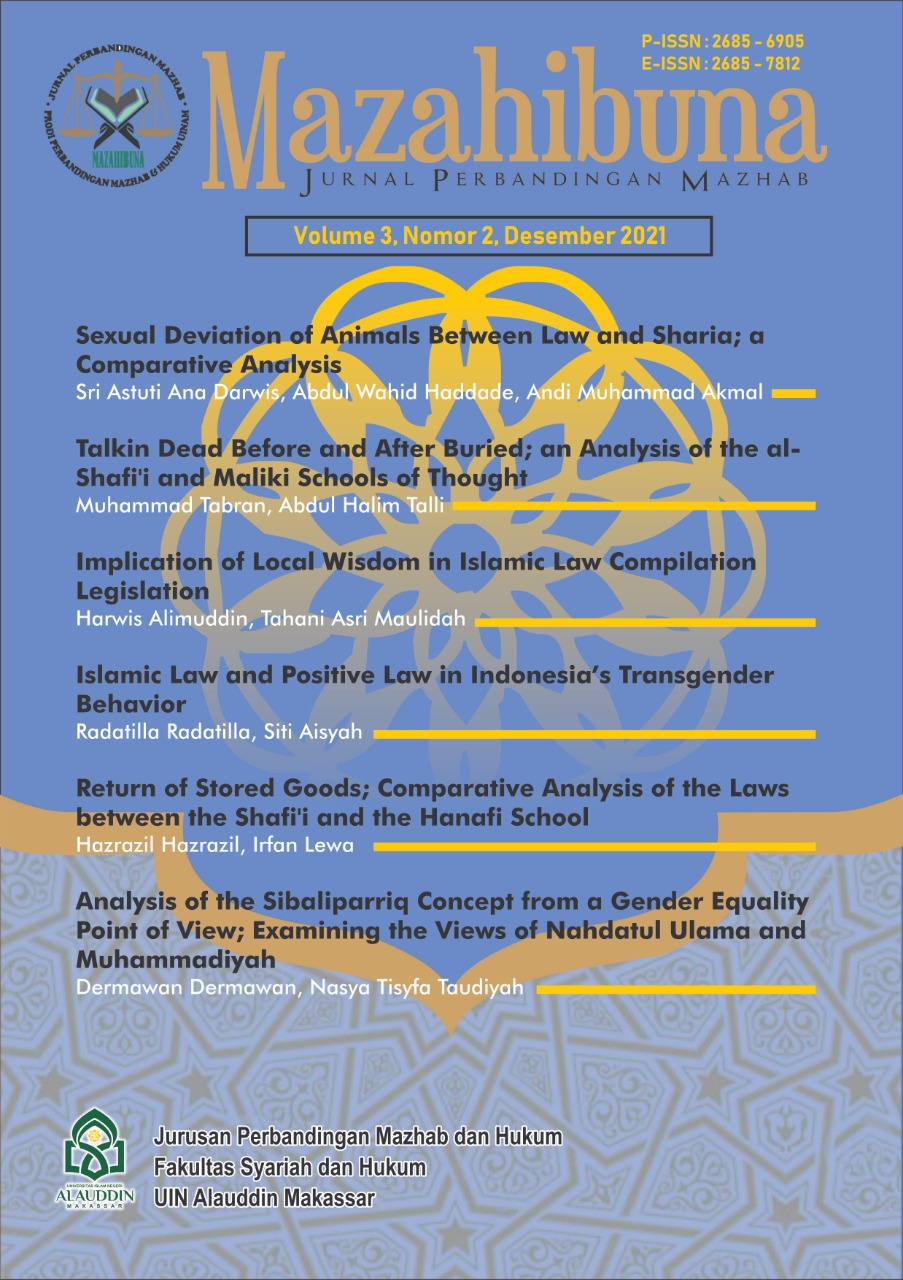Talkīn Dead Before and After Buried; an Analysis of the al-Shafi'i and Maliki Schools of Thought
Abstract
This article examines the analysis of the views of the al-Shafi'i and Maliki schools on the talqīn of the dead before and after being buried. The type of research used by the author in this study is a qualitative research type, which is a type of research that brings library research data sources in the form of books or other scientific works. using a normative approach (shari'a), which is an approach to the problem that will be studied based on texts in the Qur’an, Sunnah, and Ijmak of the scholars and obtained from various literatures related to the problems that the author will discuss, both sourced from primary and secondary data. secondary data. The results of this study found differences in views between the scholars of the al-Shafi'i School and the Maliki School regarding the legal status of talqīn before and after burial, using the legal istinbath technique of each school. The al-Shafi'i school of thought is of the view that the law of talqin before being buried or in a state of death is sunnah as well as after being buried based on the arguments and istinbath of the school's law. Unlike the Maliki school of thought, the law of talqīn before burial is sunnah, and the law of talqīn after being buried is makruh, based on the legal argument that after burial it is considered weak.
Keywords:
Talqīn Dead; Burial; al-Sha’fii School; Maliki School.
References
Abdusshomad, Muhayiddin. Fiqih Tradisionalis. Malang: Pustaka Bayan, 2004.
Ajib, Muhammad. Bermazhab Adalah Tradisi Ulama Salaf. Jakarta: Rumah Fiqih Publishing, 2018.
Al-Faifi, Syaikah Sulaiman Ahmad Yahya. Ringkasan Fikih Sunnah Sayyid Sabiq. Jakarta: Pustaka Al-Kautsar, 2013.
Al-Jazīrī, Abdurrahman. Al-Fiqh ‘Ala Al-Mazāhib Al-Arba’Ah. Cairo: Dār al-Ḫadīṡ, 2015.
Al-Nawawī, Imam. Al-Majmū’ Syarah Al-Muhazzab. Cairo: Dār al-Ma’ārif, 2016.
Al-Qurtubi, Al-Imam. Ensiklopedia Kematian Mengingat Kematian Dan Hari Ahkir. Jakarta: Cendekia, 2005.
All-Asqalānī, Ibnu Hajar. Talkhīṣ Al-Habīr. Jakarta: Pustaka Azzam, 2012.
Arofik, Slamet. “Talqin Mayit Analisis Kualifikasi Hadith Dalam Kitab Sunan Abu Dawud.” Universum 11, no. 2 (2017): 103–14. doi:10.30762/universum.v11i2.695.
Jumadil, Jumadil, and Ahmad Nuh. “Hakikat Mazhab Dan Respon Umat Islam.” Al-Azhar Islamic Law Review 2, no. 1 (2020): 16–28. doi:10.37146/ailrev.v2i1.34.
Junaidi, Syarif Hademasyah Daruluqman. Kitab Sholat Fikih Empat Mazhab Mudah Memahami Fikih Dengan Metode Skema. Jakarta: Mizan, 2010.
Karim, Abdul. “Makna Kematian Dalam Perspektif Tasawuf.” Esoterik 1, no. 1 (2015): 38.
Kementerian Agama RI. Al-Qur’an Dan Terjemahannya. Jakarta: Lajnah Pentashihan Mushaf Al-Qur’an Badan Litbang dan Diklat Kementerian Agama RI, 2019. doi:10.16309/j.cnki.issn.1007-1776.2003.03.004.
Musadad, Ahmad. Muqaranah Mazahib. Madura: Duta Media Publihising, 2017.
Putri, Siska Elasta. “Upacara Kematian Pada Masyarakat Nagari Taluak Kecamatan Lintau Buo Kabupaten Tanah Datar Dalam Perspektif Hukum Islam.” JURIS (Jurnal Ilmiah Syariah) 19, no. 1 (2020): 73. doi:10.31958/juris.v19i1.1997.
Riswan, and Muhammad Sabir Maidin. “Bermazhab Dalam Pandangan Hadis Nabis Saw.” Shautuna: Jurnal Ilmiah Mahasiswa Perbandingan Mazhab 1, no. 2 (2020): 93–112. http://journal.uin-alauddin.ac.id/index.php/shautuna/article/view/13723/8346.
Rusyd, Ibnu. Bidāyat Al-Mujtahid Wa Nihāyah Al-Muqtaṣid. Cairo: Dār al-Tauḫīd li al-Nasyr, 2015.
Sihabuddin, A. Membongkar Kejumudan Menjawab Tuduhan-Tuduhan Wahhabi Salafi. Jakarta: Naura Books, 2014.
Somad, Abdul. 37 Masalah Populer. Tafaqquh Study Club, 2015.
Syatar, Abdul, and Arif Rahman. “Transformation of Fiqh in the Forms of Pilgrimage and Zakat Legislation.” Mazahibuna 1, no. 2 (2019). doi:10.24252/MH.V1I2.11646.
Wataniyah, Ibnu. Majmu’ Syarif Tuntunan Sholat Dan Amalan Sehari-Hari Sepanjang Masa. Depok: Kayasa Media, 2018.
Zarkasih, Ahmad. Antara Kita Jenazah Dan Kuburan. Jakarta: Rumah Fiqih Publishing, 2018.

This work is licensed under a Creative Commons Attribution 4.0 International License.
Authors who publish with Mazahibuna: Jurnal Perbandingan Mazhab agree to the following terms:
- Authors retain copyright and grant the Mazahibuna: Jurnal Perbandingan Mazhab right of first publication with the work simultaneously licensed under Creative Commons Attribution License (CC BY 4.0) that allows others to share the work with an acknowledgment of the work's authorship and initial publication in this journal.
- Authors can enter into separate, additional contractual arrangements for the non-exclusive distribution of the published version of the work (e.g., post it to an institutional repository or edit it in a book), with an acknowledgment of its initial publication in this journal.
- Authors are permitted and encouraged to post their work online (e.g., in institutional repositories or on their website) before and during the submission process, as it can lead to productive exchanges, as well as earlier and greater citation of published work.

